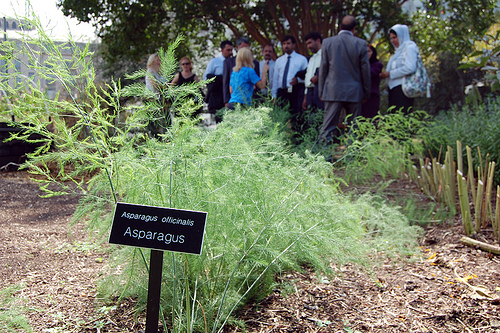Afghan Borlaug Fellows Receive Executive Training

A USDA People’s Garden outreach coordinator gives a tour of the garden to visiting Afghan Borlaug Fellows during their visit to USDA for the Borlaug program’s executive management training. The fellows spent a few days in the Washington D.C. area before visiting Washington State University in Pullman, Wash., where they learned how the U.S. land grant university system conducts research and brings new technologies to agricultural producers and agribusinesses. (Photo by Erin Tindell, Foreign Agricultural Service)
With 80 percent of Afghanistan’s population involved in farming, herding or both, agriculture is the main driver of the Afghan economy. However, only 12 percent of the country’s total land is arable and less than six percent is currently cultivated. Since 2003, the U.S. government has been working alongside Afghans to help restore the country’s once vibrant agricultural sector.
USDA’s Foreign Agricultural Service (FAS) has played a vital role in these efforts, helping to rebuild agricultural markets and improve management of natural resources in Afghanistan through a variety of activities, one of which is the Norman E. Borlaug International Agricultural Science and Technology Fellowship Program.
The Borlaug program helps developing countries strengthen sustainable agricultural practices by providing scientific training and collaborative research opportunities to visiting researchers, policymakers and university faculty. Since 2006, 28 Afghans have participated in the program.
In September, eight agricultural officials from Afghanistan spent two weeks in the United States to participate in the Borlaug Program’s executive management training.
“Most of our population relies upon agriculture, and it’s my desire to help decrease famine within our country and around the world,” said Hukum Khan Habibi, the general director of Afghanistan’s Extension and Agricultural Development. Habibi is a former Borlaug fellow and has since worked his way up the ladder from an associate agricultural professor to his current position. “I’m sure this visit will help us improve our agricultural sector by learning how USDA works from the top level down to the farmers.”
The eight fellows were from Afghanistan’s Ministry of Agriculture, Irrigation and Livestock (MAIL) and represented six provinces within the country. They spent their first three days in Washington, D.C. where they learned how USDA delivers services to farmers and consumers, manages federal programs and conducts policy development.

A group of Afghan Borlaug Fellows visit the USDA People’s Garden during their two weeks spent in the United States for the Borlaug program’s executive management training. The Borlaug program helps developing countries strengthen sustainable agricultural practices by providing scientific training and collaborative research opportunities to visiting researchers, policy makers and university faculty. (Photo by Erin Tindell, Foreign Agricultural Service)
During their time in Washington, D.C., the group was able to visit USDA’s People’s Garden, where they were especially interested in the growing produce such as soybeans, rice and peppers. The group also visited the Agricultural Research Service (ARS) headquarters in Beltsville, Md. In addition, they met with Catholic Relief Services (CRS) in Baltimore where the fellows received specialized leadership and strategic management training.
The fellows then spent a week at Washington State University (WSU) in Pullman, Wash., where they learned how the U.S. land grant university system conducts research and brings new technologies to agricultural producers and agribusinesses. They met with local small farmers and also learned about family and youth agricultural extension programs.
Over the years, Afghan Borlaug fellows have been trained on topics including animal health, post-harvest processing, rangeland management and horticulture. Since the Borlaug program’s inception in 2004, more than 500 agricultural professionals from 64 developing countries have received training. Visit FAS Rebuilding Agriculture in Afghanistan to learn more or to get involved in USDA’s efforts in the country.
